
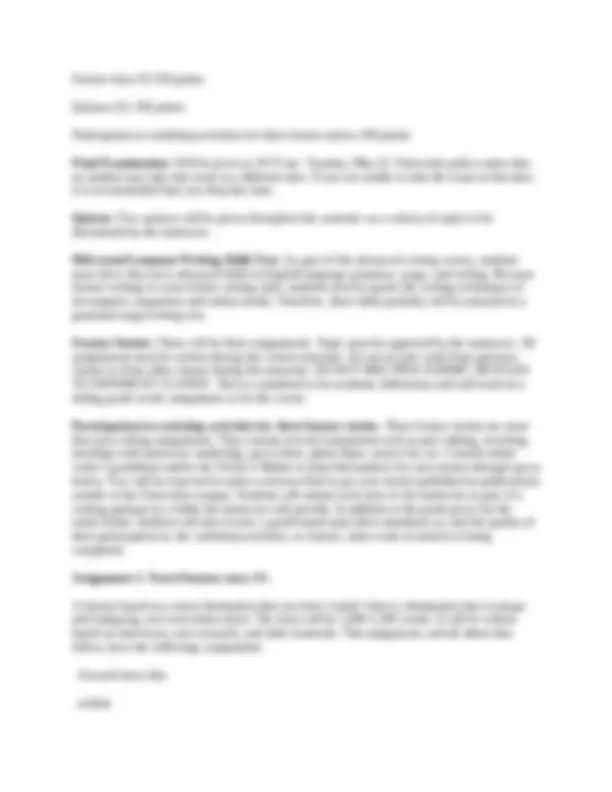
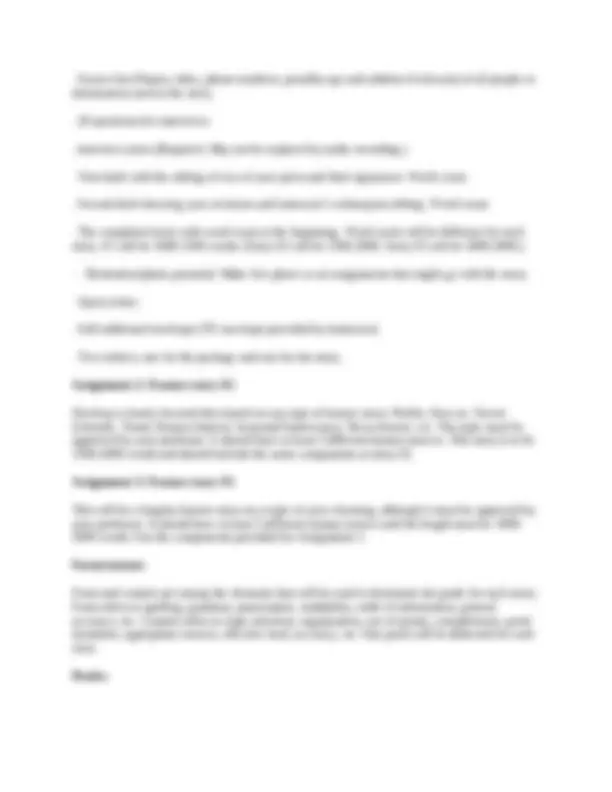

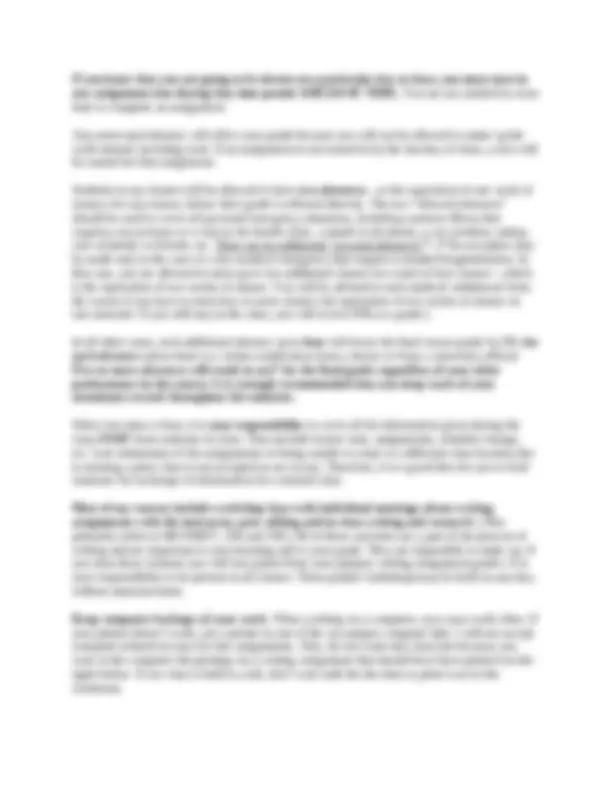
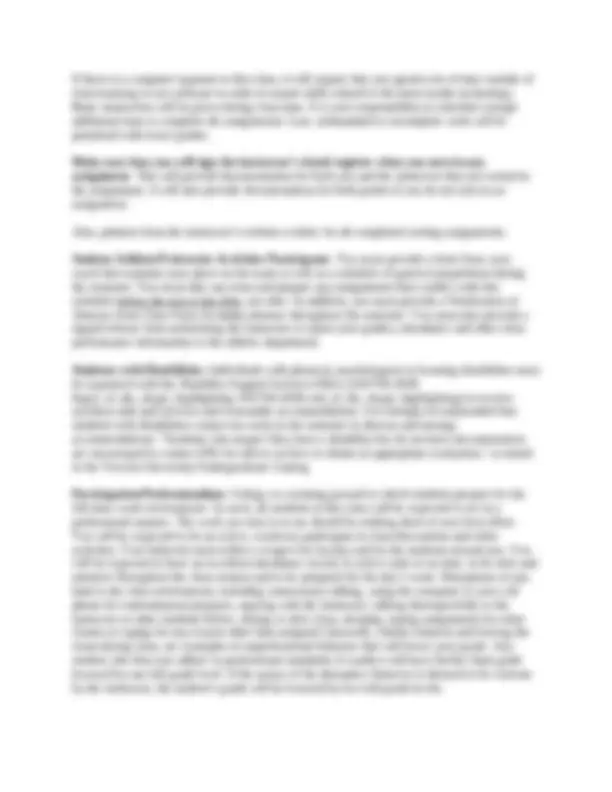
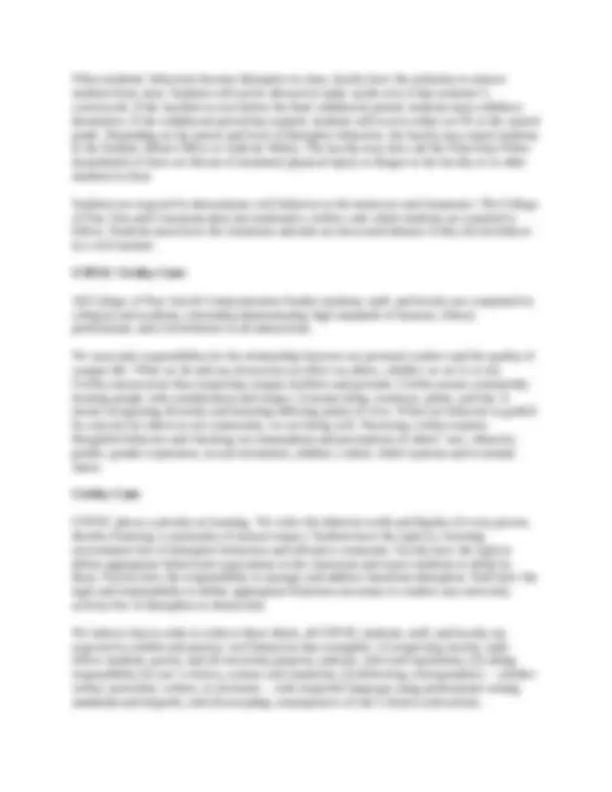
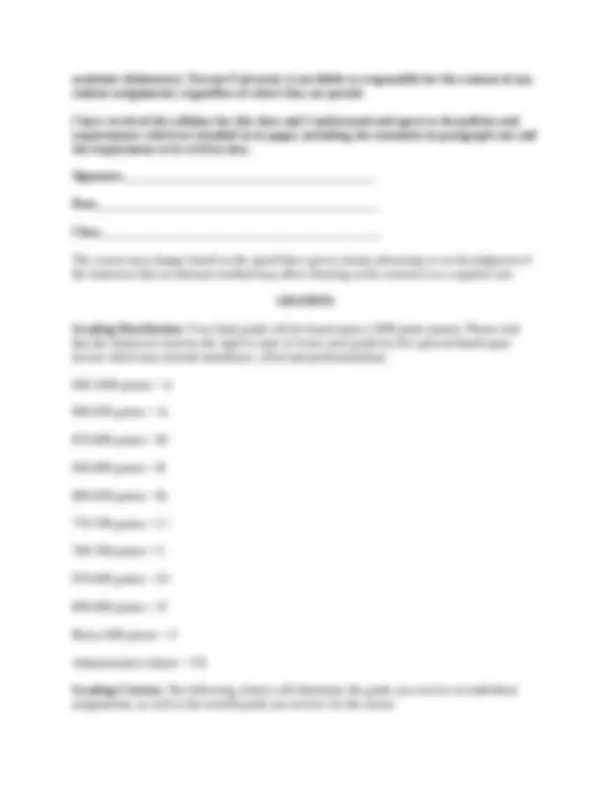
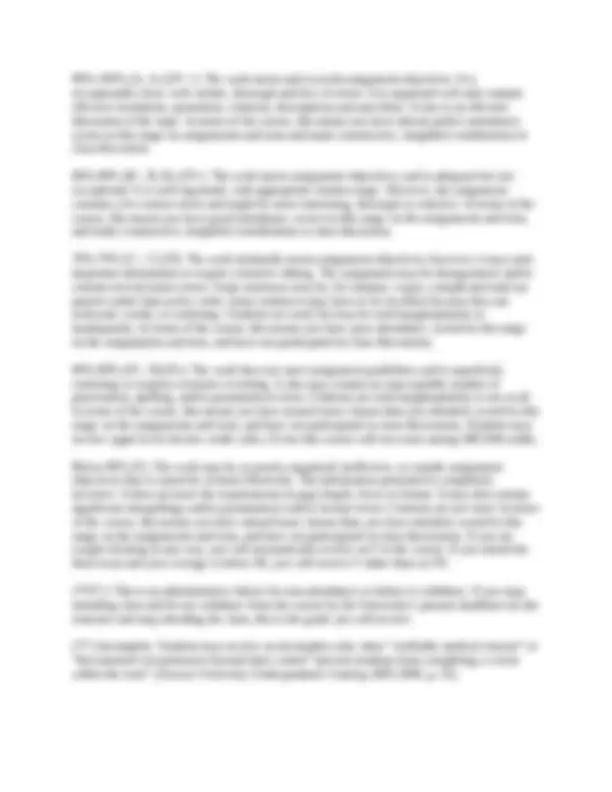
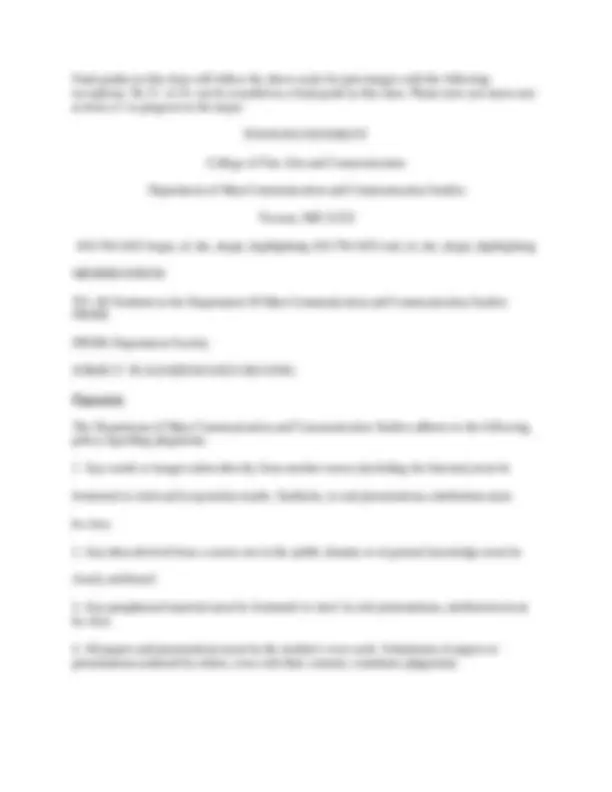
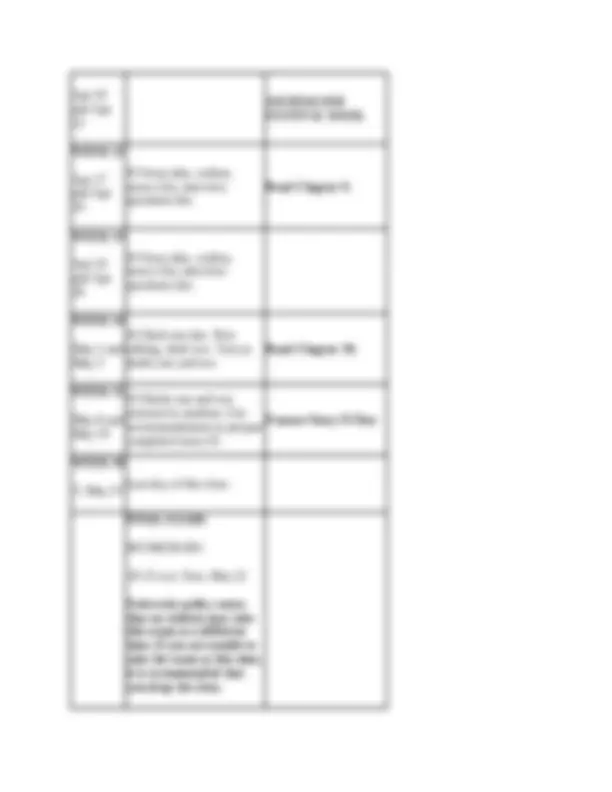



Study with the several resources on Docsity

Earn points by helping other students or get them with a premium plan


Prepare for your exams
Study with the several resources on Docsity

Earn points to download
Earn points by helping other students or get them with a premium plan
Community
Ask the community for help and clear up your study doubts
Discover the best universities in your country according to Docsity users
Free resources
Download our free guides on studying techniques, anxiety management strategies, and thesis advice from Docsity tutors
Material Type: ClassMaterial; Professor: Broadwater; Class: FEATURE WRITING; Subject: Mass Communication; University: Towson University;
Typology: Lecture notes
1 / 19

This page cannot be seen from the preview
Don't miss anything!












Spring 2012 Feature Writing MCOM JoAnne C. Broadwater Lecturer Towson University Department of Mass Communication and Communication Studies Contact Information: Office: STA 171 Email: jbroadwater@towson.edu Office hours: TTh 7:30-8 a.m. TTh 12:15-2 p.m. Office Phone: 410-704-3947 begin_of_the_skype_highlighting 410-704- end_of_the_skype_highlighting COURSE INFORMATION Course Catalog Description: Researching and writing non-fiction feature articles for publication in newspapers, magazines or online publications. Prerequisites: MCOM255 or MCOM258. Students MAY NOT take this course concurrently with either of these classes. Please note that students may not attempt a course for the third time without prior permission from the Academic Standards Committee. Information regarding this policy may be obtained through Enrollment Services. Gen Ed Learning Goals · Support the main idea in the paper by correct, strong, and germane evidence · Show strong reasoning and analysis in the paper and avoid common fallacies of logic Departmental Course Objectives
· Students should have mastered basic news writing style and Associated Press style in previous courses because Feature Writing uses all the “writing tools” of Journalism & New Media I & II and adds and expands upon them. · Students will learn to become self-starters, who can come up with their own ideas. As an upper level writing class, the majority of the grade for this class comes from writing lengthy feature articles based on the student’s own ideas. Students interested in writing for newspapers, magazines, or online publications will need this ability to work independently. · Students must meet deadlines and follow directions. Because students will be learning how to market ideas and articles, each assignment includes several components in addition to the actual feature story. · Students will learn to become precision writers who like a challenge. Sloppy writers are doomed because every typo, spelling mistake, grammar mistake, AP style mistake loses points and with long assignments that can mean a low grade very quickly. · Students will learn to independently interview, research, write and market their own feature stories. COURSE REQUIREMENTS Required Textbooks: The following is required material for the course: Feature Writing: The Pursuit of Excellence 7th edition. By Edward Jay Friedlander and John Lee (Allyn and Bacon). The Associated Press Stylebook and Briefing on Media Law. (2011 edition) Recommended Supplemental Text: Writer’s Market Additional Requirements: A USB drive A computer (either at home or in a campus computer lab) with access to the Internet Assignments and Grading (total of 1000 points): Mid-term: Grammar/Writing Skills test: 100 percent Feature story #1 (travel) 150 points Final exam: 100 percent Feature story #2 200 points
. Source list (Names, titles, phone numbers, possibly age and address if relevant) of all people or information used in the story. . 20 questions for interviews . interview notes (Required. May not be replaced by audio recording.) · First draft with the editing of two of your peers and their signatures. Word count. . Second draft showing your revisions and instructor’s subsequent editing. Word count. . The completed story with word count at the beginning. Word count will be different for each story. #1 will be 1000-1500 words. (Story #2 will be 1500-2000. Story #3 will be 1800-2000.) · · Illustration/photo potential. Make five photo or art assignments that might go with the story. · Query letter. . Self-addressed envelope (TU envelope provided by instructor) . Two rubrics, one for the package and one for the story. Assignment 2: Feature story #2: Develop a clearly focused idea based on any type of feature story: Profile, How-to, Travel, Lifestyle, Trend, Human Interest, Seasonal/Anniversary, News-feature, etc. The topic must be approved by your professor. It should have at least 3 different human sources. This story is to be 1500-2000 words and should include the same components as story #2. Assignment 3: Feature story #3: This will be a lengthy feature story on a topic of your choosing, although it must be approved by your professor. It should have at least 5 different human sources and the length must be 1800- 2000 words. Use the components provided for Assignment 1. Form/content: Form and content are among the elements that will be used to determine the grade for each story. Form refers to spelling, grammar, punctuation, readability, order of information, general accuracy, etc. Content refers to topic selection, organization, use of quotes, completeness, good transition, appropriate sources, effective lead, accuracy, etc. One point will be deducted for each error. Drafts:
There will be several drafts written of each article. The first draft should be polished and well done. Two students will edit it for you, marking recommendations and signing the documents. Students will be graded on the quality of their editing of classmates’ papers. You will make changes and corrections based on the peer editing and then turn in your first and second drafts to the instructor. The instructor will look over the first draft and edit the second. You will then make changes to the second draft, prepare a final draft and turn it in for grading. GUIDELINES FOR WRITTEN WORK IN FEATURE WRITING: · Papers are due within the first 10 minutes of class. Any late papers will be docked up to a full letter grade for each day they are late unless the student has a verifiable excused absence. The written documentation of that excused absence must be attached to the paper. The written excuse only counts for the exact day(s) the excuse covers; the paper is then due in my mailbox in the department office to avoid late penalties. · NO late papers will be accepted after the last day of classes for a semester. · Make sure you submit a source list and other materials with each story assignment. · Do not plagiarize, fabricate, or submit work you have done for another class. You may only submit stories written during the current semester. · Stories must be typed, double-spaced, in correct form and style, and give word count. · Proofread and correctly copy edit your copy! All spelling, punctuation, grammar, AP style, and factual errors will cause you to lose grade points. Grading criteria for individual writing assignments: 90 – 100 (A & A-) Publishable work. It is a story that is clear, interesting, and well-written. It illustrates excellent interviews and research, is well organized, has effective quotes and smooth transitions and no spelling, grammar, or accuracy errors. 80 – 89 (B+, B, & B-) Publishable with some editing. It may have some minor spelling or grammatical errors but has evidence of good interviews and research. The lead is effective. The body is cohesive and well-organized. 70 – 79 (C+ & C) Requires extensive editing to publish. Several sections must be rewritten. The lead may not be a good fit for the topic or may fail to entice readers. The body of the story is disorganized, lacks focus, and contains many minor errors. It uses weak or no quotes and no evidence of research. (Note: You must make a C in this class to receive credit for it in the MCOM major.) 60 – 69 (D) Needs a complete rewrite to be published. The facts are presented ineffectively, and information may be missing. The story contains an unacceptable number of spelling, grammar,
In this class, students who ignore this rule will be reprimanded and asked to leave the classroom with a recorded absence. If they ignore the rule a second time, they will have their final grade lowered by one full grade level, as defined above. Check the online site for this course for assignments and class news and also check your email daily for class information and messages from the instructor. College regulations require that all students use their official Towson email for university communication. Faculty will not respond to messages from students using non-Towson University email accounts. Complete and turn in ALL assignments at the beginning of class, on or before the due date. Journalists do not miss deadlines. I will automatically lower your grade by ten percent within the first 24 hours for any late assignment, regardless of the reason for the lateness. I do NOT printout emailed assignments. If an emergency prevents you from getting to class on the day an assignment is due, email it to me by the beginning of class so that I know you finished it on time. You must bring a printout to me on the day that you return to class, along with documentation of the emergency. Any late papers must be turned in no later than the class after the due date. If you do not have documentation of the emergency, I will not accept the assignment and you will receive a zero. Take all exams and quizzes on the scheduled date. No makeup quizzes or exams will be given unless the absence is excused. If you miss a quiz or exam your must contact me IMMEDIATELY and provide written documentation of the reason for the absence on the day of your return. You must also be prepared to make up the exam on that day if the absence is excused. If the exam is not made up on the day of your return, you will forfeit your right to make up the work. Otherwise, students who miss a quiz or exam will receive a zero. Any make- up quiz or exam will be much more difficult than the regular assignment, so you are strongly advised to complete the work as scheduled. At the instructor’s discretion, a take-home exam, quiz or paper may be administered. Pop quizzes on current events, vocabulary, grammar, writing technique, lecture notes and assigned readings may be given at any time without prior notice. Students who miss a pop quiz will not be able to make it up. The University attendance policy is found in the Towson University Undergraduate Catalog : Absences will only be excused if you: (1) have an illness or injury precluding you from attending class; (2) observe a religious holiday that prevents you from class attendance; (3) are required to participate in a university activity by a recognized authority; or (4) experience a compelling, verifiable emergency beyond your control. Acceptable written documentation must be provided to verify the reason for your absence. This includes a physician’s note, traffic accident report, court summons, hospital bill, etc., all of which must be dated and signed. Providing documentation does not guarantee an absence will be excused. Other absences (funerals, weddings, etc.) will be addressed on a case-by-case basis and may not be considered excused. Documentation of these absences must be provided as well.
If you know that you are going to be absent on a particular day or days, you must turn in any assignment due during that time period AHEAD OF TIME. You are not entitled to extra time to complete an assignment. Any unexcused absence will affect your grade because you will not be allowed to make up the work missed, including tests. If an assignment is not turned in by the last day of class, a zero will be earned for that assignment. Students in my classes will be allowed to have two absences —or the equivalent of one week of classes–for any reason, before their grade is affected directly. The two “allowed absences” should be used to cover all personal emergency situations, including common illness that requires rest at home or a visit to the health clinic, a death in the family, a car problem, taking care of family or friends, etc. There are no additional “excused absences”. (An exception may be made only in the case of a true medical emergency that requires extended hospitalization. In this case, you are allowed to miss up to two additional classes for a total of four classes—which is the equivalent of two weeks of classes. You will be advised to seek medical withdrawal from the course if you have to miss four or more classes–the equivalent of two weeks of classes–in one semester. If you still stay in the class, you will receive FX as a grade.) In all other cases, each additional absence up to four will lower the final course grade by 5% for each absence unless there is a written notification from a doctor or from a university official. Five or more absences will result in an F for the final grade regardless of your other performance in the course. It is strongly recommended that you keep track of your attendance record throughout the semester. When you miss a class, it is your responsibility to cover all the information given during the class ASAP from someone in class. They include lecture note, assignments, schedule change, etc. Late submission of the assignments or being unable to come to a different class location due to missing a prior class is not accepted as an excuse. Therefore, it is a good idea for you to find someone for exchange of information for a missed class. Most of my courses include workshop days with individual meetings about writing assignments with the instructor, peer editing and in-class writing and research. (This primarily refers to MCOM257, 356 and 358.) All of these activities are a part of the process of writing and are important to your learning and to your grade. They are impossible to make up. If you miss these sessions you will lose points from your primary writing assignment grades. It is your responsibility to be present in all classes. These graded workshops may be held on any day, without announcement. Keep computer backups of your work. When working on a computer, save your work often. If your printer doesn’t work, use a printer in one of the on-campus computer labs. I will not accept computer-related excuses for late assignments. Also, do not come into class late because you were in the computer lab printing out a writing assignment that should have been printed out the night before. If our class is held in a lab, don’t wait until the due date to print it out in the classroom.
When students’ behaviors become disruptive to class, faculty have the authority to remove students from class. Students will not be allowed to make up the rest of that semester’s coursework. If the incident occurs before the final withdrawal period, students must withdraw themselves. If the withdrawal period has expired, students will receive either an FX or the earned grade. Depending on the nature and level of disruptive behaviors, the faculty may report students to the Student Affairs Office or Judicial Affairs. The faculty may also call the University Police immediately if there are threats of imminent physical injury or danger to the faculty or to other students in class. Students are expected to demonstrate civil behavior to the instructor and classmates. The College of Fine Arts and Communication has instituted a civility code which students are required to follow. Students must leave the classroom and take an unexcused absence if they do not behave in a civil manner. COFAC Civility Code All College of Fine Arts & Communication Studies students, staff, and faculty are committed to collegial and academic citizenship demonstrating high standards of humane, ethical, professional, and civil behavior in all interactions. We must take responsibility for the relationship between our personal conduct and the quality of campus life. What we do and say always has an effect on others, whether we see it or not. Civility means more than respecting campus facilities and grounds. Civility means consistently treating people with consideration and respect. It means being courteous, polite, and fair. It means recognizing diversity and honoring differing points of view. When our behavior is guided by concern for others in our community, we are being civil. Practicing civility requires thoughtful behavior and checking our assumptions and perceptions of others’ race, ethnicity, gender, gender expression, sexual orientation, abilities, culture, belief systems and economic status. Civility Code COFAC places a priority on learning. We value the inherent worth and dignity of every person, thereby fostering a community of mutual respect. Students have the right to a learning environment free of disruptive behaviors and offensive comments. Faculty have the right to define appropriate behavioral expectations in the classroom and expect students to abide by them. Faculty have the responsibility to manage and address classroom disruption. Staff have the right and responsibility to define appropriate behaviors necessary to conduct any university activity free of disruption or obstruction. We believe that in order to achieve these ideals, all COFAC students, staff, and faculty are expected to exhibit and practice civil behaviors that exemplify: (1) respecting faculty, staff, fellow students, guests, and all university property, policies, rules and regulations; (2) taking responsibility for one’s choices, actions and comments; (3) delivering correspondence – whether verbal, nonverbal, written, or electronic – with respectful language using professional writing standards and etiquette; and (4) accepting consequences of one’s choices and actions.
The use of offensive, threatening or abusive language, writing, or behavior will not be tolerated and can lead to academic dismissal. Further information about civility can be found in Appendix F of the university catalog. Examples will not be listed on the COFAC website. The inclusion of examples is a per professor prerogative. Faculty members are encouraged to discuss expected classroom/student/teacher behaviors. Examples demonstrating civility in the classroom as a student include: Being respectful of the professor and other students. Not texting or using cellular phones and other electronic devices. Not using your laptop for activities other than class work. Not eating or drinking in class. Not reading newspapers or listening to music during the class. Not sleeping in class. Examples demonstrating civility in the classroom as a faculty member include: Being respectful of the students. Attempting to understand individual student needs and learning styles. Discussing civil behavioral expectations during the first class. Taking time to talk with students whose behaviors negatively affect the classroom. Encouraging students to follow your civil behavior. Plagiarism/Academic Dishonesty : Plagiarism, cheating and/or fabrication will not be tolerated and will carry serious consequences in this course and in media careers. Journalists value their integrity and strive to present the truth to their audiences to the best of their ability. Students will be asked to live up to these standards as well. You are expected to adhere to Towson’s policy on cheating and plagiarism. If you are caught breaking this policy, you will be prosecuted to the full extent that the policy allows. Everything you write must be in your own words. If an idea is not your own, your must attribute it. All sources used must be cited. This includes Powerpoint presentation slides, which MUST be in your own words. Do not cut and paste. Making up quotations or information is forbidden. Presenting another person’s work as your own, purchasing reports online or from an individual, copying a classmate’s assignment, failing to attribute information to the appropriate
academic dishonesty). Towson University is not liable or responsible for the content of any student assignments, regardless of where they are posted. I have received the syllabus for this class and I understand and agree to the policies and requirements which are detailed in its pages, including the statement in paragraph one and the requirement to be civil in class. Signature__________________________________________ Date_______________________________________________ Class_______________________________________________ The course may change based on the speed that a given classis advancing or on the judgment of the instructor that an alternate method may allow learning at the current or at a superior rate. GRADING Grading Distribution: Your final grade will be based upon a 1000 point system. Please note that the instructor reserves the right to raise or lower your grade by five percent based upon factors which may include attendance, effort and professionalism. 940-1000 points = A 900-939 points = A- 870-899 points = B+ 840-869 points = B 800-839 points = B- 770-799 points = C+ 700-769 points = C 670-699 points = D+ 600-669 points = D Below 600 points = F Administrative failure = FX Grading Criteria: The following criteria will determine the grade you receive on individual assignments, as well as the overall grade you receive for the course.
90%-100% (A, A-) (Ö++): The work meets and exceeds assignment objectives. It is exceptionally clear, well written, thorough and free of errors. It is organized well and contains effective transitions, quotations, citations, descriptions and anecdotes. It also is an effective discussion of the topic. In terms of the course, this means you have almost perfect attendance, scores in this range on assignments and tests and make constructive, insightful contributions to class discussion. 80%-89% (B+, B, B-) (Ö+): The work meets assignment objectives, and is adequate but not exceptional. It is well organized, with appropriate citation usage. However, the assignment contains a few minor errors and might be more interesting, thorough or cohesive. In terms of the course, this means you have good attendance, scores in this range on the assignments and tests, and make constructive, insightful contributions to class discussion. 70%-79% (C+, C) (Ö): The work minimally meets assignment objectives; however, it may omit important information or require extensive editing. The assignment may be disorganized, and/or contain several minor errors. Some sentences may be, for instance, vague, complicated and use passive rather than active verbs. Some sentences may have to be rewritten because they are awkward, wordy, or confusing. Citations are used, but may be used inappropriately or inadequately. In terms of the course, this means you have poor attendance, scored in this range on the assignments and tests, and have not participated in class discussions. 60%-69% (D+, D) (Ö-): The work does not meet assignment guidelines and is superficial, confusing or requires extensive rewriting. It also may contain an unacceptable number of punctuation, spelling, and/or grammatical errors. Citations are used inappropriately or not at all. In terms of the course, this means you have missed more classes than you attended, scored in this range on the assignments and tests, and have not participated in class discussions. Students may receive upper level elective credit with a D, but this course will not count among MCOM credits. Below 60% (F): The work may be so poorly organized, ineffective, or outside assignment objectives that it cannot be revised effectively. The information presented is completely incorrect. It does not meet the requirements in page length, focus or format. It may also contain significant misspellings and/or grammatical and/or factual errors. Citations are not used. In terms of the course, this means you have missed more classes than you have attended, scored in this range on the assignments and tests, and have not participated in class discussions. If you are caught cheating in any way, you will automatically receive an F in the course. If you attend the final exam and your average is below 60, you will receive F rather than an FX. (“FX”): This is an administrative failure for non-attendance or failure to withdraw. If you stop attending class and do not withdraw from the course by the University’s present deadlines for the semester and stop attending the class, this is the grade you will receive. (“I”) Incomplete: Students may receive an incomplete only when “verifiable medical reasons” or “documented circumstances beyond their control “prevent students from completing a course within the term” ( Towson University Undergraduate Catalog 2005-2006 , p. 25).
Any student found plagiarizing in any of the above ways will receive an automatic “F” for the assignment and may receive an “F” for the course. Documented evidence of the plagiarism will be kept in the department office, and will be reported to the Office of Judicial Affairs. Any student discovered soliciting others to write a paper, speech, test, or other assignment for that student will receive an automatic “F” for the course. There are ambiguities in concepts of plagiarism. Faculty will be available for consultation regarding any confusion a student may have. Most students are careful to avoid blatant plagiarism, the unacknowledged copying of exact words of the source. However, students must also be aware that the concept of plagiarism extends not only to wording but to patterns or sequences of ideas. If you paraphrase without acknowledgement, using the same sequence or structure as the original author, then you are plagiarizing. Students have the right to appeal a charge of plagiarism. An appeal starts with the chairperson of the department. Cheating The Department of Mass Communication and Communication Studies has adopted the following policy regarding cheating: ANY STUDENT CAUGHT CHEATING ON ANY QUIZ OR EXAM WILL RECEIVE A MINIMUM OF AN “F” ON THE QUIZ OR TEST AND A MAXIMUM OF AN “F” FOR THE COURSE. Revised 1-11- MCOM356 SPRING 2012 COURSE SCHEDULE (Disclaimer: Schedule subject to change at the discretion of the professor.) WEEK 1 Jan 31 and Feb 2 Intro to course. Read Chapter 1. WEEK 2 Feb 7 and Feb 9 #1Story idea, outline, source list, interview questions due. Remember: Last day to drop with no grade reported is Tues, Feb 7. Read Chapter 2. WEEK 3 #1 Interview notes due. Read Chapter 3.
Feb 14 and Feb 16 WEEK 4 Feb 21 and Feb 23 #1 Draft one due. Peer editing, draft two. Turn in drafts one and two. Read Chapter 4. WEEK 5 Feb 28 and Mar 1 #1 Drafts one and two returned to students. Use recommendations to prepare completed story #1. Read Chapter 5. Feature Story #1 Due Mar. 1. WEEK 6 Mar 6 and Mar 8 #2Story idea, outline, source list, interview questions due. WEEK 7 Mar 13 and Mar 15 #2 Interview notes due. Read Chapter 6. WEEK 8 Mar 19- Mar 23
Mar 27 and Mar 29 #2 Draft one due. Peer editing, draft two. Turn in drafts one and two Read Chapter 7. WEEK 10 Apr 3 and Apr 5 #2 Drafts one and two returned to students. Use recommendations to prepare completed story #2. Read Chapter 8. Feature Story #2 Due WEEK 11 Remember: The last day to withdraw with a grade of W is F, Apr 13.